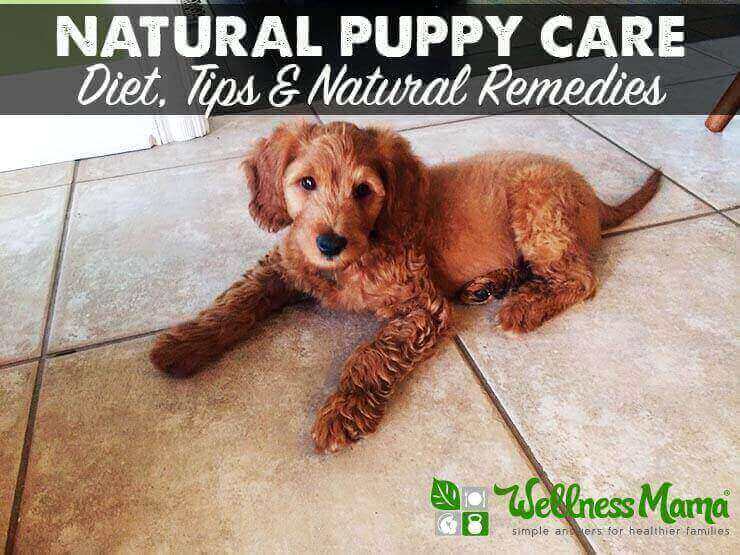Our family recently adopted a new puppy (after the loss of our long-time family dog, Daisy, several months ago), so I have been researching and talking to friends who are experts in puppy care and to holistic veterinarians about how to make sure we are raising him in the healthiest way possible.
His name is Frazier (pictured above) and my kids are thoroughly smitten with him. He is a Goldendoodle mix and has a wonderful temperament with the kids.
Natural Puppy Care
We hope to have Frazier around for a long time, so we’ve started feeding him a raw food diet at the recommendation of our vet. He is also the first indoor dog we’ve ever had (much to the chagrin of my husband) so I wanted to find natural and safe ways to make sure he was protected from common pests without using chemicals that would be harmful to our children.
Here are the natural foods and remedies we are using for our new puppy…I’m sure there will be a lot more I’ll be adding to this list over the next several months and years.
Puppy Probiotics
Like humans, dogs have a diverse colony of bacteria that lives in their guts and is vital for health. Many books and websites recommend giving dogs natural, unsweetened yogurt in cases of upset stomach, but I found an even better solution: puppy probiotics!
These Puppy Probiotics were recommended by a friend who is a vet to help properly develop our puppy’s gut bacteria. It has a mix of pre-biotics, probiotics, digestive enzymes, l-glutamine and natural immunoglobulins for parvovirus. (Note: Use the code WMPuppy20 to get 20% off!)
Another pet probiotic that is easy to give (I sprinkle it on food) is from Just Thrive. You may recognize their name as I highly recommend their regular probiotic (for humans!) and many other products they offer.
Natural Puppy Food
When we adopted Frazier, he had been eating a high-quality grain-free dry dog food, which was a decent option, but I decided to switch him to a raw food diet.
Our vet advised that making any type of major dietary change was not advisable for a puppy and might cause an upset stomach, so we made sure he was taking probiotics and slowly started switching him over to a raw food.
This post outlines the diet we are feeding him and how we made the switch.
DIY Puppy Treats
We are in the process of training our puppy, and as any well-trained dog owner knows, it’s much easier to train when using treats as an incentive for good behavior. Of course I didn’t want to use an off the shelf box of conventional dog treats, so I created a simple and healthy treat that I could use for training. I made a batch of my regular homemade dog treats but made them in 1/2 tsp mini-treat sizes so that I could use them for training without over-feeding him.
Now, I keep a batch of these in a jar in the fridge for training times.
Topical Chamomile
I found this suggestion in a book about holistic dog care. It recommended using brewed chamomile tea in several ways:
- Topically for stomach aches
- Using a brewed but cooled chamomile tea bag on a dog’s eyes for conjunctivitis
- Using a compress or spray bottle of brewed tea on skin irritation and itching
- Internally for dogs who have an upset stomach and are easily nervous or have anxiety
Epsom Salt Baths
I love epsom salt baths for myself, but it turns out that the magnesium in epsom salts can be good for dogs too. Thankfully, we haven’t needed this remedy yet, but a book recommended giving a dog an epsom salt bath to help speed recovery of wounds, skin infections, rashes or other external problems. Of course, you’d want to talk to your vet and follow their instructions before doing this.
Diatomaceous Earth
I’ve used Diatomaceous Earth as a natural pest remedy in our home and as an internal cleanser for years, and it is great for dogs as well. Diatomaceous Earth (DE) is a finely powdered natural fossilized form of diatoms, a type of algae.
DE is rich in silica and extremely hard with a negative charge, making it useful in several ways. It’s structure makes it ideal for naturally killing insects and pests (like fleas, ants, etc) and for gently cleansing the digestive system and strengthening hair, skin and nails at the same time (due to the silica content). It’s tiny particles are very sharp, but not harmful to human tissue, though they break down the exoskeleton of insects.
For dogs, it is recommended to use DE externally on their coats to ward off fleas and other pests, and to add a small amount to their food to protect against internal parasites and worms. I’d definitely ask a vet first, but we use a small amount on Frazier’s dry coat after a bath and add a small amount to his food a couple times a week.
Those are all the steps we’re currently using to care for our “wellness puppy”. I’m sure there will be quite a few more I’ll be writing about soon.
Do you have any pets? What are your best natural pet care tips? Please share below!


Leave a Reply